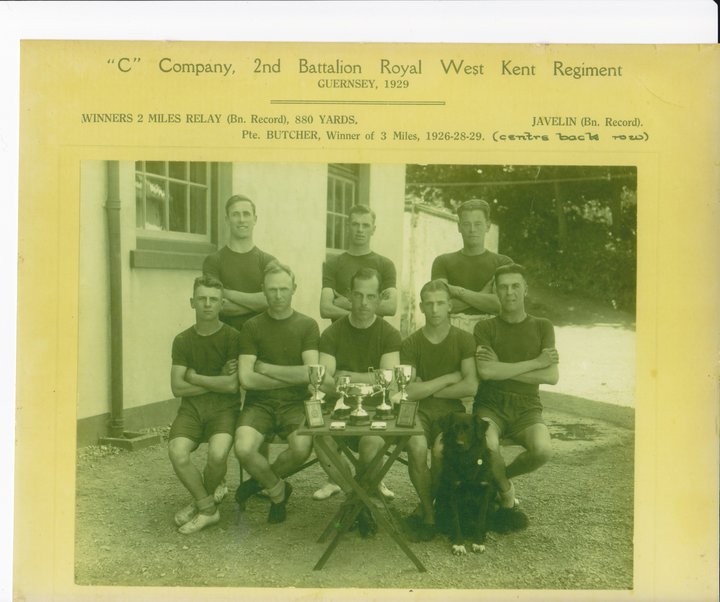It’s Memorial day in the US soon. I wanted to show a picture of my Grandfather. He had been a British soldier between the wars, but was living in the US when the war in Europe started. He went back to fight for Britain. I’ve been trying to find the role he played, but very hard to do. One day perhaps I’ll go to Britain and try and track down his war records. Two other family members went back with him to fight for Britain and both died in the Battle of Britain. They were in the US, which was a neutral country for about 2 and a half years. They needn’t have gone back, but they did. There’s no memorial to them in the US for this Memorial day, but perhaps there should be.
At that stage, Britain had both air superiority and superiority at sea. Being an island, this made it relatively safe from invasion. The only chance the German’s really had to beat Britain beyond the Battle of Britain was to starve the country of food and supplies using its submarine fleets. Large amounts of war time supplies were coming from North America by convoy. Canada sent over 500 convoys to supply Britain, and the Canadian navy suffered terribly in the protection of the convoys. America played a peace time part in helping supply the convoys. They were critical. But with those supplies continuing to arrive, Britain was safe. A stalemate had occurred in that theatre of war.
In North Africa, the German blitzkrieg had been frustrated by Australian and British troops who had held Tobruk behind the German lines for many months. Eventually British, Australian and other Commonwealth forces overcame the Germans at a decisive battle at El Alamein, Egypt, and forced the Germans to retreat from Egypt and Libya to Tunsia. This was largely ahead of the American arrival.
In Russia, the Germans had failed to take Moscow, and the Russians had held their ground at Stalingrad and Leningrad with terrible losses on both sides. So when America entered the war, the Germans were actually stalemated on two fronts, and were losing severely on a third. America’s entry tipped the scales to a timely victory.
But what would have happened if Britain and her Commonwealth had failed to hold before that day? What if America had remained isolationist, just concentrating on war with Japan perhaps? Well time would have been lost, and time was critical for everyone if Germany was to be defeated at all.
At the end of the war Germany had almost perfected its V3 rockets, they had already launched the V1s and V2s against Britain. The Germans nicknamed the V3s the New York rockets. That’s right, rockets that could be used to attack the American east coast. What’s scarier than that? The German’s had an advanced nuclear program.
Few American’s would know this, but the Manhatten Project – the project that helped develop America’s own nuclear capability – wasn’t initiated by Americans. It was suggested to the Americans by the British, who thought it unwise to develop such a program in Britain where it might be attacked by German bombers. Members of the British Cavendish labs were sent to the US to help start the program. Without the British (and actually Commonwealth scientists such as Sir Mark Oliphant were also critical) America would not have started the program to develop its own nuclear capability.
With a little more time the German’s would have beaten everyone to developing the first nuclear weapons, and with their New York rockets, they could, and would, have leveled the East Coast of America, as well as Russia. So it’s pretty safe to say that without Britain and its Commonwealth, who didn’t surrender before America entered the war, but instead held the Germans at bay, and actually beat them in North Africa, the US would eventually have lost the war. Another year may have been all it took for Germany to have rained nuclear terror from across the Atlantic.
Where were we? Oh, yes. From one perspective, America can claim to have won the war, by breaking the stalemate that then existed. But they didn’t do it alone. Britain, with its Commonwealth, had held their own. Russia was there too. From another perspective, Britain and its Commonwealth, who had been on the front line two and a half years earlier than the US, can rightly claim to have saved America’s sorry ass, because if they hadn’t held (and actually begun to turn the tide against Germany) Germany would almost certainly have had enough time to develop its nuclear weaponry, and then it was game over for everyone.
It seems that all the allies were needed, even the Russians (though we really don’t talk about them any more).
Oh, and on a personal note, my grandfather survived the war, I know that he was in North Africa and Normandy, but he survived and returned to the US, eventually dying there. I visit where he lived when I can, a beautiful part of Virginia.

 RSS Feed
RSS Feed
